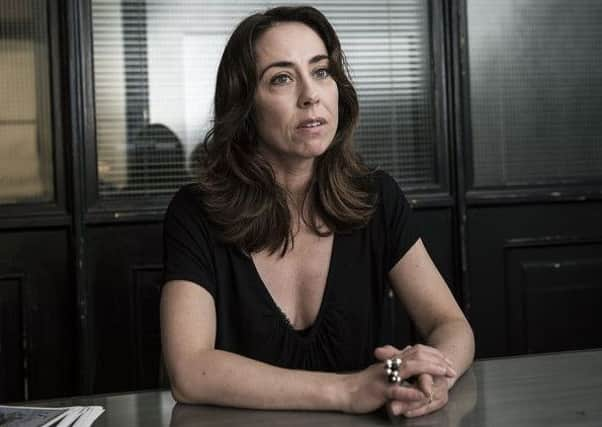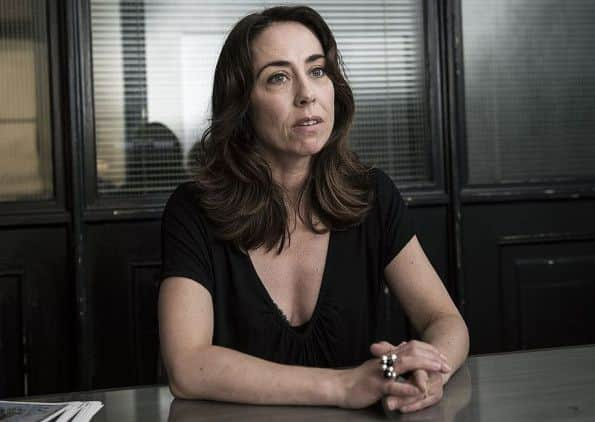Star of The Killing set for Edinburgh festival


Actress Sofie Grabol – who played detective Sarah Lund in the Bafta-winning crime series – has been cast as Queen Margaret, Danish wife of James III, in the last of an epic new trilogy.
Written by Scots playwright Rona Munro, the National Theatre of Scotland plays for the nation’s flagship arts festival will explore how three generations of Stewart Kings – James I, II and III – ruled Scotland when it was an independent nation.
Advertisement
Hide AdAlthough some characters and events will be invented for the stage, historical records from one of the most turbulent eras in Scottish history helped shape the scripts.


Taggart star Blythe Duff, has also been cast in The James Plays. She will appear as two different characters across the three shows, which will feature a 20-strong ensemble of actors and see some audience members seated on the stage of the Festival Theatre.
The trilogy – billed as a “landmark of Scottish drama in a remarkable year” – were commissioned by the theatre company last year – the first new work read by artistic director Laurie Sansom after he took the post.
One of the biggest productions to be staged at the EIF for years, the three plays will be performed over a two-week period, with some performances staggered to allow audiences to see all three shows in the one day.
NTS has promised that when viewed together they will offer a “complex and compelling narrative on Scottish culture and nationhood”.
Other events will see hundreds of theatre-goers travel around the Scottish National Portrait Gallery in Edinburgh to take in a series of short monologues inspired by famous Scots in its collection, with Mary Queen of Scots, Sir Walter Scott, Charles Rennie Mackintosh and Sir Alex Ferguson among the possibilities.
Advertisement
Hide AdThe day before the referendum, the former home of the Scottish Parliament on the Mound will host a 12-hour event featuring Scots from all walks of life reading famous Scottish “lyrics, letters, polemics and poems” and performances of live music.
Aberdeen-born playwright Ms Munro said she wrote the part of Queen Margaret with Grabol in mind, never believing she would take it on.
Advertisement
Hide AdShe added: “I found out at the end of last year that she had agreed to take on the part. It was such a difficult secret to keep, especially from fellow fans of The Killing. All of the way through writing the plays I had her in mind. I met her last week but only actually believed it when it was announced today.”
The 45-year-old actress, who was in London last week for rehearsals, said: “I have never done theatre in English and it will be a great challenge for me, but luckily for me Queen Margaret, who I am going to play, is Danish.
“She is such an interesting character. Also, the issues around this character are so modern, you wouldn’t imagine that the story takes place so many years ago. As well as being about Scotland and national identity and all of that, the play is also about relationships, about men and women, and about love.”
The first joint production between the Festival, the National Theatre of Scotland and the National Theatre of Great Britain, The James Plays will transfer to London in October. A deal which will see the Scottish Government foot most of the bill for the production, was agreed last month – several months after Sir Jonathan Mills, director of the EIF, came under fire over plans to sidestep the independence debate in his swansong programme this year.
He said there was nothing “specific” in the scripts for The James Plays relating to the referendum debate, but the issues they raised were “highly suggestive and informative” and would give Scots an idea of where they had come from.
Mr Sansom, who succeeded Vicky Featherstone as artistic director in March of last year, had already approached the festival about staging the plays by the time Sir Jonathan found himself embroiled in controversy.
Advertisement
Hide AdSir Jonathan said he wanted to put on the production as soon as he read Ms Munro’s scripts last spring, adding: “The material literally jumped off the page at me and made me delve into my history books.”
But Mr Sansom said discussions over how to make the production happen were still ongoing in the summer and autumn of last year, before the final go-ahead was given to stage the production as part of a year-long series of NTS shows looking at Scotland’s “past, present and future” which will continue up until the eve of the referendum.
Advertisement
Hide AdSir Jonathan, who plans to use the staging of the Commonwealth Games in Scotland and the 100th anniversary of the First World War to inspire his farewell programme, insisted he had not come under any external pressure to include Munro’s plays in his final programme.
The Scottish Government confirmed it was ploughing £200,000 into the production, via its flagship “Edinburgh Festivals Expo Fund”, although the EIF is refusing to say what the total cost of staging the three plays will be.
He told The Scotsman: “The decision to do it was made the moment I had finished reading it, but there is a difference between wanting to do something and making a final decision, because they’re not about the artistic bits, but the practicalities, such as do we have the resources and the right venue. That took a little bit longer.
“There was no pressure from the government at all. There were no meetings or discussions between us because we didn’t believe there was a problem.
“We have been entirely consistent and non-reactive in our behaviour.”
Joyce McMillan: A project set to resonate with past, present and future
Advertisement
Hide AdJONATHAN MILLS, director of the Edinburgh International Festival, may have caused some controversy, back in 2013, with his insistence that he would not be touching on Scotland’s independence referendum in this year’s programme.
Now, though, here comes a National Theatre Of Scotland programme that not only takes exactly the opposite view, but sweeps the Edinburgh International Festival along with it, in a huge project that is bound to resonate with ideas about Scotland’s past, present and future.
Advertisement
Hide AdIf Rona Munro’s massive King James trilogy is the centrepiece of the year’s work, though, what’s most remarkable about the NTS’s 2014 programme is both its willingness to engage directly with the referendum debate, and its determination to honour the idea of an experimental, boundary-busting 21st century national theatre, vigorously developed by the NTS’s founding director Vicky Featherstone during her years in Scotland.
From a series of five-minute Yes No Don’t Know plays from all over Scotland, streamed live to audiences on a single day in June, to a massive Blabbermouth event at the Assembly Hall on Edinburgh’s Mound on the eve of the referendum, there will be dozens of NTS events and fragments, often appearing in unexpected places, that will allow people to consider Scotland’s big decision in spaces far from the normal constraints of yes-no political argument.
Add a new show about cult Scottish genius Ivor Cutler, and a rich strand of revivals of past hits from Dunsinane to Glasgow Girls, and you have what should be
a 2014 programme to remember; rooted in the founding idea of the NTS as a “theatre without walls”, but absolutely of its time, and set to reflect the mood of a momentous year for Scotland.
• Joyce McMillan is The Scotsman’s chief theatre critic
Highlights of the National Theatre of Scotland’s Dear Scotland season in 2014.
Rantin’, across Scotland, January-March: Described as “part cosy living room gathering, part play, part gig session”, Kieran Hurley’s show, first staged at Cottiers Theatre in Glasgow last year, promises to reveal the patchwork identity of a nation, with performances in intimate venues across the country, including Argyll, Ayrshire, Lanarkshire, Fife, Perthshire, Ullapool, Mull, Shetland and Orkney.
Advertisement
Hide AdDear Scotland, Scottish National Portrait Gallery, April-May: A promenade performance through the gallery’s collection will see a cast of 20 “heroes, villains, rogues and royals” from the 16th century to the present day brought to life, with actors performing monologues by leading Scottish writers.
The Great Yes, No, Don’t Know, Five Minute Theatre Show, June: Playwrights David Greig and David MacLennan are masterminding a one-day event tackling the independence debate and featuring more than 200 theatre shows, each just five minutes long, being performed on at least 15 stages around the world, and all available to watch online.
Advertisement
Hide AdThe James Plays, Edinburgh Festival Theatre, August: Rona Munro’s epic trilogy of “history plays” on the reigns of Scottish Kings James I, II and III of Scotland promises to be one of the hottest tickets of Sir Jonathan Mills’ swansong as director of the Edinburgh International Festival, with stage and screen star Blythe Duff and The Killing’s Sofie Grabol among the 20-strong cast.
Blabbermouth, Assembly Hall on The Mound, Edinburgh, September: On the eve of the referendum which will seal Scotland’s fate, more than 100 of the nations “greatest texts” – ranging from political speeches to song lyrics and comedy routines – will be performed by a host of Scots, including artists, broadcasters, celebrities and sporting stars.
In Time O’ Strife, September-October: Marking the 30th anniversary of the 1984 miners’ strike, Graham McLaren’s re-imagining of Joe Corrie’s 1926 classic play about the impact of the General Strike on mining communities in Fife – written to help raise funds for soup kitchens for miners’ and their families – heads off on its first tour after an acclaimed premiere in Kirkcaldy last year.